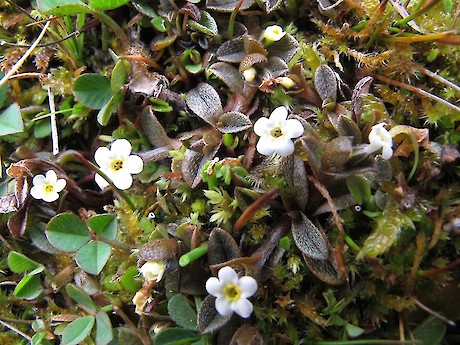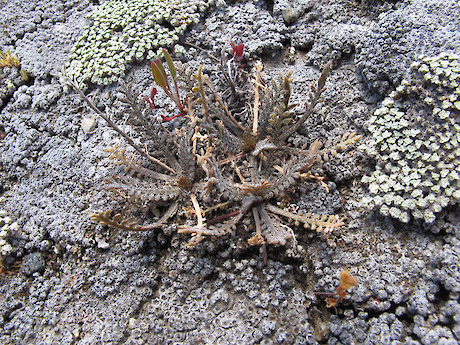Please note, these field trips will run on Wednesday 7 December 2022 although they were originally scheduled for 23 March 2022. As of 31 January the conference has been rescheduled due to changes in Covid Alert levels and the number of registered delegates exceeding 100 people. For more information visit this page about the 2022 conference postponement. We wish to thank the people running these workshops and the venues for their flexibility and support.
There are four conference field trips to choose from which range from easy to moderate in intensity and showcase a range of plant communities and restoration considerations for the Queenstown Lakes District area.
Field trip 1: Islands
When: 08:30-17:30
Where: Walter Peak and Wāwāhi Waka/Pigeon Island
Intensity: medium
Field trip leaders: Rowan Hindmarsh-Walls with support from Neill Simpson and Tony McQuilkin
Numbers: Limited to 25 people (minimum of 15 people to run) (this field trip is now full)
Cost: $65
About: Water taxi to Wāwāhi Waka /Pigeon Island. Wāwāhi Waka is predator free with wonderful bird song. The mature red beech forest contains the only pōkākā, tūrepo and kahikatea in the district with mataī and tōtara. Extensive restoration after 2 fires has also occurred. A water taxi will then take us to Walter Peak Station, where hectares of Douglas fir have been removed and there is now an extensive native restoration project. Walk along the lake edge to the DOC camping site and inspect the amazing growth after 6 years. Return to Queenstown on the TSS Earnslaw. Note that all boat trips and lunch are included in the price.
 Myosotis bryonoma. Photo: John BarklaField trip 2: Mountains
Myosotis bryonoma. Photo: John BarklaField trip 2: Mountains
When: 09:00 -17:00
Where: Lake Alta and the Remarkables ski area
Intensity: medium-high
Field trip leaders: Arne Cleland and Jo Smith, supported by Melissa Jager and Ross Lawrence
Numbers: Limited to 28 people (this field trip is now full)
Cost: $30
About: Lake Alta – located within the stunning Remarkables Conservation Area at an elevation of 1800 m, is the easiest high alpine environment you will access on foot! This walk boasts amazing alpine scenery, including wetlands, cushion fields and tussock grassland. This diversity of habitats begets a diversity of alpine species including Myosotis bryonoma (first described in 2018) as well as Hectorella caespitosa, Leucogenes grandiceps, and Ranunculus buchananii. We will also look at the restoration and transplanting of alpine communities including tussock grasslands undertaken by NZ Ski. Note: you will need to bring your own lunch on this field trip.
 Lepidium solandri. Photo: John BarklaField trip 3: Drylands
Lepidium solandri. Photo: John BarklaField trip 3: Drylands
When: 08:30-17:00
Where: Crown Range; Butterfield Wildlife Management Reserve; Mahaka Katia/Pisa Flats Scientific Reserve; Cromwell Chafer Beetle Scientific Reserve; Roaring Meg
Intensity: medium
Field trip leaders: Brian Rance and Jesse Bythell, supported by Geoff Rogers.
Numbers: 40 (this workshop is now full)
Cost: $35
About: A whistle-stop tour of several significant dryland sites to learn about their specialised flora, unique management challenges and restoration efforts. Our first stop is Butterfield Wildlife Management Reserve where we will hear about restoration planting efforts including rare shrub species. Lunchtime will see us settled in at Mahaka Katia/Pisa Flats Scientific Reserve where will hear from Ellery Mayence (DOC rare ecosystem science lead) about monitoring work at this highly significant site. Be prepared to get down on your hands and knees and marvel at tiny, threatened dryland plants like Lepidium solandri and Raoulia monroi. Then we’ll swing by the Cromwell Chafer Beetle Scientific Reserve and head back to Queenstown via the Kawarau Gorge with a short stop at Roaring Meg to see an example of broadscale conifer removal. Note: you will need to bring your own lunch on this field trip.
Field trip 4: Restoration sites
When: 08:30-17:00
Where: Lake Hayes, Whitechapel, Feely Hill, Slope Hill, Treespace/Coronet Forest, Morning Star Reserve, Tucker Beach
Intensity: low
Field trip leaders: Ben Teele and John Barkla
Numbers: 40
Cost: $25
About: A terrific tiki tour of native community restoration sites across the Wakatipu Basin, including grey shrubland, riparian, and forest sites encompassing a range of habitats and threatened species. Note: you will need to bring your own lunch on this field trip.
